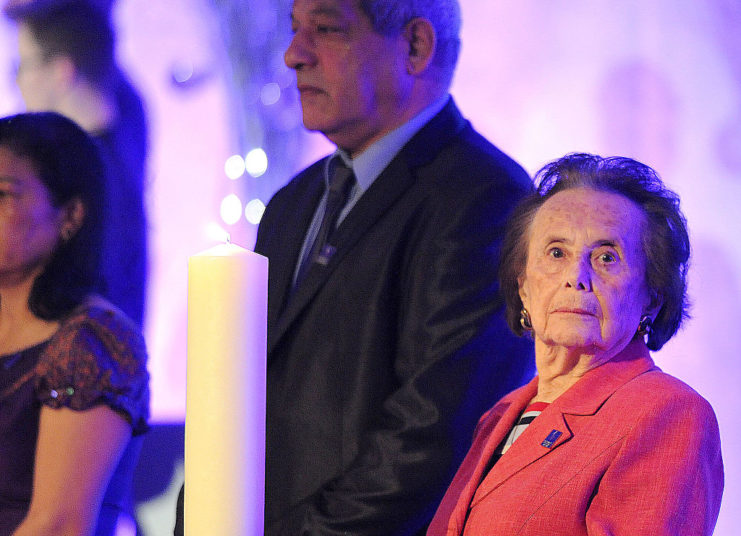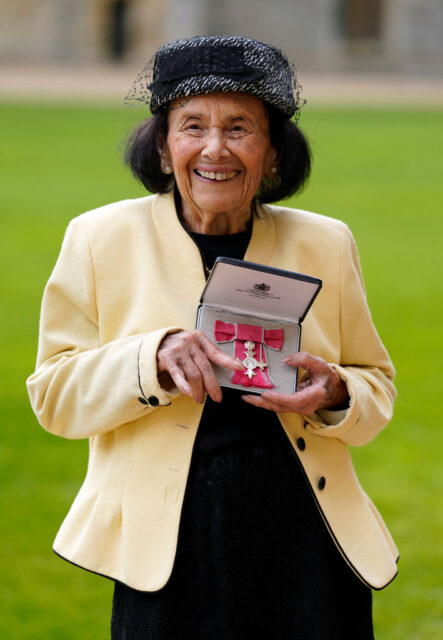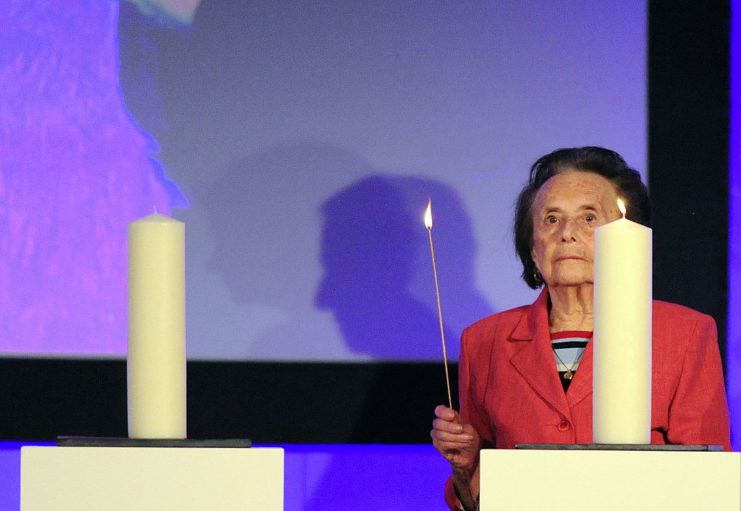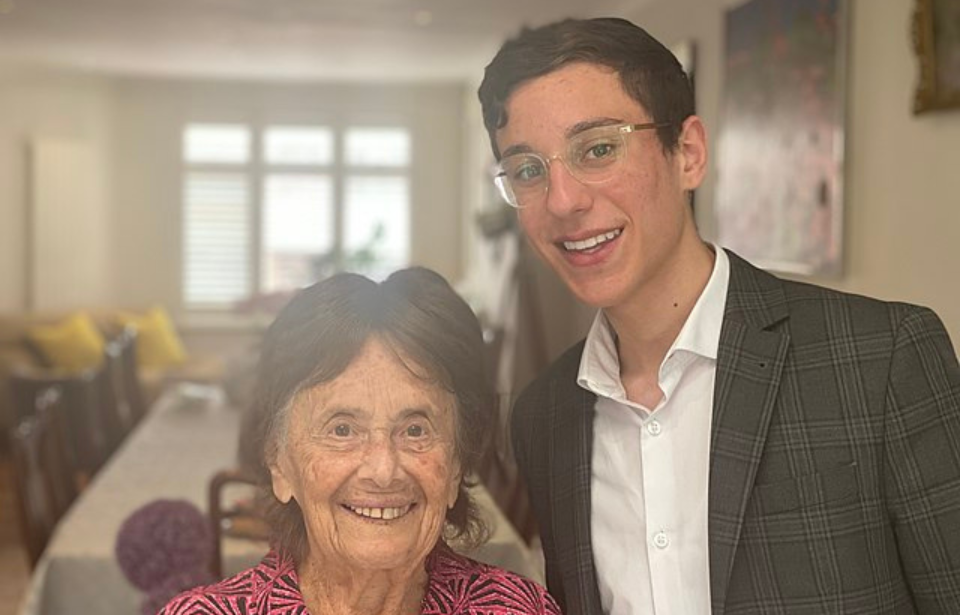Holocaust survivor Lily Ebert faced the worst humanity could throw at her when she was taken from her home in Hungary and transported to Auschwitz. When she and other survivors were liberated in 1945, she experienced hope and encouragement, as a result of a small act of kindness from an American soldier.
Lily Ebert was transported to Auschwitz

Lily Ebert was born on December 29, 1923, in Bonyhád, Hungary. In the early months of 1944, German troops invaded the town and enacted the anti-Semitic policies experienced by Jews across Europe. What began as curfews and wearing yellow stars soon resulted in Ebert and her family being moved to a ghetto.
In May 1944, Ebert’s family was put on a train to Pécs and sent to a transit camp. Three months later, she, her mother, her brother and her three sisters were put into cattle cars and forced to endure the long trip to Auschwitz.
Upon their arrival, the occupants of the transport were lined up in front of SS officer Josef Mengele. Ebert and two of her sisters were chosen to work in the camp, while her mother, brother and other sister were sent to the crematorium. The three remained imprisoned at Auschwitz for four months.
Unbeknownst to the guards, Ebert kept in her possession a gold pendant her mother had given to her when she was a young child. It remained hidden in the heel of her shoe until it wore down, after which she hid it in bread rations. She’d worn the pendant until her death in October 2024.
Liberated while on a death march

Four months after arriving at Auschwitz, the three sisters were transferred to the Altenburg work camp, near Leipzig, where they worked in an ammunition factory. By April 1945, the Allies were continuing to chip away at German strongholds throughout the eastern portions of Europe, forcing them to resort to even more extreme and dehumanizing measures.
Lily Ebert and her sisters were liberated while on a death march near Pfaffroda, five km from the Czech border. For weeks, they and other survivors were under the care of American soldiers, before being billeted by a German family. They were transferred, next, to Buchenwald, which had been turned into a place to accommodate Jewish survivors.
A small act of kindness

While at Buchenwald, the Ebert sisters learned the Swiss government was offering shelter to hundreds of Jewish children. Despite being young adults, the three were given permission by a Swiss Red Cross nurse to relocate. According to Lily Ebert, this was most likely due to their malnourishment, which made them look younger than they were.
As they were getting ready to depart, a Rabbi’s assistant approached Ebert. The young American soldier from New York bid her farewell, for which she thanked him. It was then he did something she’d never forget: he took out an Alliierte Militärbehörde 10-mark note from his pocket.
He’d intended to pull out a spare sheet of paper, but, instead, grabbed the military currency. On it, he wrote the following: “A start to a new life. Good luck and happiness.” He signed it “Assistant to Chaplain Schacter,” and tried to write out his name in Hebrew. He handed it to her and they parted ways.
Ebert vowed to keep the banknote forever, to ensure she never forgot the GI.
Dov Forman’s mission to identify the unknown American soldier
Yesterday my great Grandma (Lily Ebert – an Auschwitz survivor) showed me this bank note- given to her as a gift by a soldier who liberated her. Inscribed, it says “a start to a new life. Good luck and happiness”. Later on, she met up with those who freed her (third photo). pic.twitter.com/LAx2ZGFCnH
— Dov Forman (@DovForman) July 5, 2020
In 2020, Lily Ebert’s great-grandson, Dov Forman, found the banknote in her family photo album. Not long after, he set to work tracking down the soldier who’d given his great-grandmother hope all those years ago.
On July 5, 2020, he tweeted out a message, informing his followers of the currency. The tweet was shared by the Auschwitz Memorial Museum and quickly went viral. Just eight hours later, Forman was sent a message, which contained an image of a young man in uniform. It read, “The assistant to Rabbi Schacter.”
After translating the Hebrew on the banknote – “Hi Yom Shul Man” – and comparing the handwriting, a positive identification was made. The soldier’s name was Pvt. Hyman Schulman. He’d passed away in 2013. While she couldn’t thank him personally, Lily Ebert was able to set up video calls with his living relatives.
Keeping awareness alive until the very end

After residing in Switzerland for awhile, Lily Ebert moved to Israel, where she got married and had three children. She moved to London, United Kingdom, in 1967, where she has dedicated her life to speaking about her experiences during World War II. For her efforts, she was awarded the British Empire Medal (BEM) in 2015, and she was named a Member of the Order of the British Empire (MBE) in ’23.
“I promised myself that if I survived by some miracle, I would tell the world what happened there,” she explained to NBC News in 2020. “The next generation and next generations should know the story, so that something like that should not be repeated to any human being ever.”
Inspired by the efforts of those on social media to locate Hyman Schulman, Ebert allowed her great-grandson to create an account for her on TikTok. She used her videos to answer questions about the Holocaust, and her efforts saw her gain a following of about two million.
More from us: Gerda Weissmann Klein: The Holocaust Survivor Who Fell In Love With Her American Liberator
Want War History Online‘s content sent directly to your inbox? Sign up for our newsletter here!
Ebert also wrote a book, Lily’s Promise: How I Survived Auschwitz and Found the Strength to Live. In it, she told the story of her childhood, her time at Auschwitz, and her determination to keep herself and her sisters safe.
